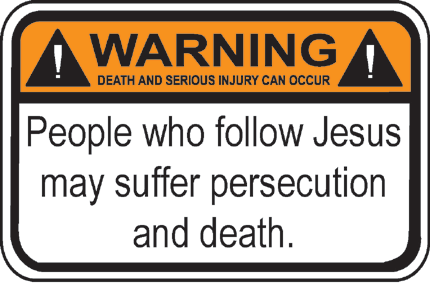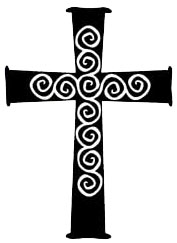|
The Rev. Frank
Logue
Finding Your Cross It “is of the highest responsibility, to preach in Christian sermons—yes, precisely in Christian sermons—AGAINST Christianity.” This is a quote from the Danish Philosopher Søren Kierkegaard. Far from being anti-Christian, Kierkegaard loved Jesus and his great purpose in life was to renew Christianity. So why would he write in his book Works of Love, it “is of the highest responsibility, to preach in Christian sermons—yes, precisely in Christian sermons—AGAINST Christianity.” Kierkegaard believed it so emphatically; that much of the sentence is in italics and the word “against” is in all capitals. Kierkegaard gave this statement immediately on the heels of a parable. He had just written, I wonder if a man handing another man an extremely sharp, polished, two-edged instrument would hand it over with air, gestures, and expression of one delivering a bouquet of flowers? Would not this be madness? What does one do, then? Convinced of the excellence of the dangerous instrument, one recommends it unreservedly, to be sure, but in such as way that one warns against it. For the Danish philosopher, Christianity should come with a warning label—a clear, unmistakable notice of the dangerousness of faith in Jesus Christ. And why not? We put warning labels on everything else from complex and quite dangerous machinery to a cup of coffee. Christianity, at its best, threatens to change your life. Shouldn’t it also come with a warning label. Perhaps Bibles should have a labels. Not a mature content label. Though that may also apply. After all, my Old Testament professor in seminary said, “The Bible is not for children. I’m sorry, it’s just not.” No the label would read more like:
Warning: This is absolutely why the Rev. Daniel Berrigan said, “If you are going to follow Jesus, you'd better look good on wood.” Daniel Berrigan is on to something, “If you are going to follow Jesus, you'd better look good on wood.” Historically speaking, Christians who genuinely conform their lives to that of Jesus Christ don’t fare too well. This is why Søren Kierkegaard felt it was of the highest priority to preach against Christianity. Kierkegaard was in favor of the sort of warning Jesus gave his disciples in our Gospel reading for this morning, Jesus began to show his disciples that he must go to Jerusalem and undergo great suffering at the hands of the elders and chief priests and scribes, and be killed, and on the third day be raised. This was even more distressing to his disciples to hear this than it is to us. We have the hindsight offered by the resurrection. We know the whole plan can and did work. Peter and the other disciples only know that Jesus’ talk of suffering and death does not sound like God’s plan. Peter in a rare diplomatic move takes Jesus aside before speaking up. When they are alone, Peter admonishes Jesus, saying, “God forbid it, Lord! This must never happen to you.” Then Jesus turns and says to Peter, “Get behind me, Satan! You are a stumbling block to me; for you are setting your mind not on divine things but on human things.” This is the same Peter who Jesus in the reading just before this, which we read last Sunday called Peter the Rock on which he would build his church. In just moments, steady, slow-to-change Peter goes from solid rock foundation to stumbling block and Peter does this by seeking his own will rather than God’s will. Whenever we try to hinder God’s will, we become a stumbling block. The Greek word for a stumbling block is “skandalon.” “A stumbling block” is literally “a scandal.” And the only scandal in Christianity was to be the cross itself. Coming to terms with the fact that God loves you so much that Jesus would suffer and die rather than give up on that love is a scandal. We Christians are called to embrace the scandal of the cross, pray for God’s will in our lives and move on to living that life of faith. I read some years ago an email making its way around the internet in which a man has a dream. In the dream the man is carrying a cross, which represents the burdens of his life. He complains to Jesus about all he has to shoulder and Jesus says the man can exchange his cross for another cross. The man gratefully jumps at the chance and in the way dreams work they both are suddenly in a large warehouse. The man leans his cross against the wall and walks around look at the many crosses from which he can now choose. The man tries a number of the other crosses and finds them too large or burdensome to bear. Finally, he finds one just right and is a bit embarrassed to note that it is the smallest cross in the great space, but he asks Jesus for this new cross just the same. Jesus agrees, then lets him know that this is the cross the man was carrying when he entered. I’m not exactly sure of the theology of this story as many people who hear it may in fact have large burdens to bear. The story won’t always fit. The other problem is that the cross of Christ is not equal to the burdens we have in life. The cross of Christ is equal to great love and unflinching obedience to God’s will. I may have many burdens to bear in this life that have nothing to do with taking up my cross and following Jesus. For example, listening to my same dumb jokes over and over is a burden that my wife, Victoria and our daughter, Griffin, bear. Nevertheless, this great burden is not taking up a cross and following Jesus. So what does it mean to take up your cross and follow Jesus? It means to be a servant of others in obedience to God’s will. Taking up your cross means to love others as Jesus loved and to show compassion for others as Jesus showed compassion. Jesus didn’t have to go looking for the cross. Jesus only had to share the love of God with others completely and the cross found him. The apostle, Peter would eventually find himself in the same predicament. Sure, Peter did try to go against God’s will to keep Jesus off the cross. But after the resurrection, Peter came to share his faith without fear of persecution. Peter came to share in Jesus’ suffering, though he never considered himself worthy of it. The tradition is that when the Emperor Nero put Peter to death as a scapegoat in the aftermath of the burning of Rome, he ordered that Peter be crucified. Peter protested that he was not worthy to die like his Lord and asked not for his life to be spared, but that he could be crucified upside down. When Victoria and I led a High School Youth Group at St. Peter’s Church in Rome, Georgia, I took to wearing a cross earring upside down. I wasn’t worthy to wear the cross right side up I reasoned and the upside down cross was a good discussion starter. People would routinely tell me the cross was upside down. I would then let them know that the cross was that way out of respect for Peter, not by accident or disrespect for Jesus. Peter knew that his death did not equal the death of Jesus. Peter knew what his cross was and Peter’s cross was not his Lord’s cross. Peter found his cross by showing the same love and compassion for others that Jesus showed. You too can find your own way to take up your cross and follow Jesus. It begins with showing love and compassion and it never ends. Jesus says that if you are willing to lose your life in this way, you will find it. You won’t find a life of fame. Though some like Archbishop Desmond Tutu or Mother Theresa became famous that was incidental to their spiritual journeys. You also won’t find fortune and glory through taking up your cross and following Jesus. What you will find is the path to life—a fulfilling life in this world and life eternal in the world to come. It is this end of time pay off that Jesus emphasizes as he asks his disciples, “For what will it profit them if they gain the whole world but forfeit their life? Or what will they give in return for their life? For the Son of Man is to come with his angels in the glory of his Father, and then he will repay everyone for what has been done.” Yet, in my own life, I don’t emphasize the pay off of heaven. After all, I’m not a Christian as a means of fire insurance. I am a Christian because living a life aware that my life is lived present to God is the best most fulfilling way I know how to live. Furthermore, the Christian life would be the most fulfilling and best life even if their was no heaven. The life eternal is extra. It’s gravy. The afterlife is the grits that come unordered with your breakfast, just like the free gift of grace. But this sermon is not given to tell how eternal life is a free bonus to a life of faith in Jesus. And this sermon is not about the meaning and purpose faith can give you. This sermon is fair warning. Consider it my warning label sermon or maybe my truth-in-advertising sermon.
Even though that it remains true that injury and death can result from your faith in Jesus, I can recommend no better life than to take up your cross and follow Him. Amen. |

 Being
a Christian may be infinitely better than living life without the peace and
the hope we have in Jesus, but this faith we have is dangerous stuff. I
unreservedly recommend Christianity, but in a way to warn against it. People
who follow Jesus may suffer persecution and death...that is if we get it
right, if we really live out the love and compassion Jesus us wants us to live
in service to others.
Being
a Christian may be infinitely better than living life without the peace and
the hope we have in Jesus, but this faith we have is dangerous stuff. I
unreservedly recommend Christianity, but in a way to warn against it. People
who follow Jesus may suffer persecution and death...that is if we get it
right, if we really live out the love and compassion Jesus us wants us to live
in service to others.